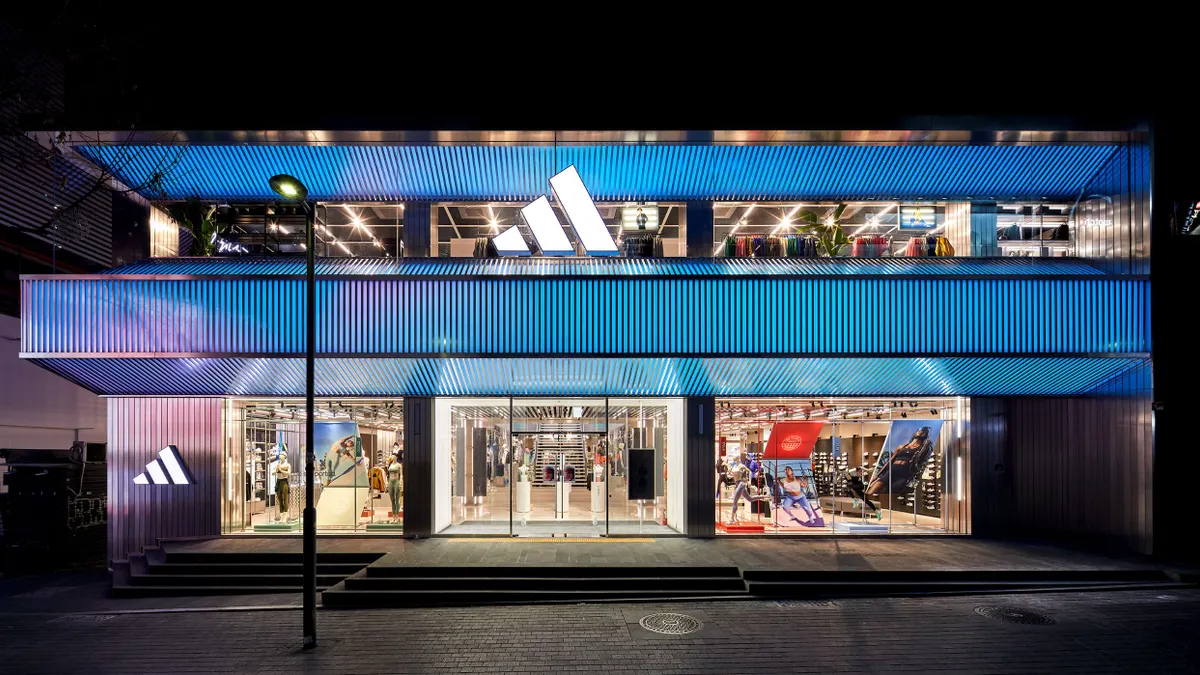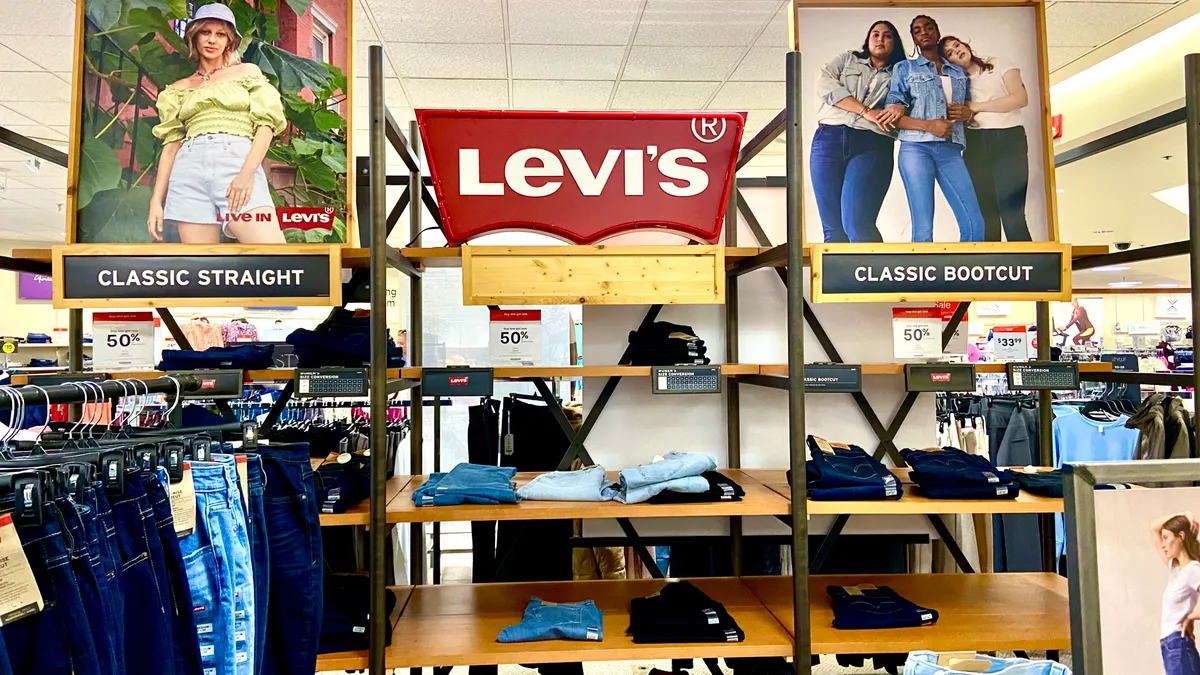Despite already being the largest company in the world, Walmart is still hungry for growth. On Tuesday, the retail powerhouse announced its latest acquisition of a digitally native millennial brand — four-year-old women's plus-size apparel brand Eloquii.
While Walmart did not disclose the deal price, a person familiar with the acquisition told Recode Tuesday afternoon that Walmart will pay $100 million, roughly two and a half to three times Eloquii's annual revenue. An anonymous source also told CNBC it valued the company at $100 million and that other retailers had been interested in buying Eloquii during the process.
Neither Walmart nor Eloquii responded to Retail Dive's requests for additional details, however, it's clear that the buy is a move at capturing a slice of the $21 billion women's plus-size apparel market. Eloquii has been a disruptive force in the space over the last few years, developing a unique relationship with its customers.
To understand just what the deal will mean for Walmart, it's important first to look at the makeup of Eloquii.
Who is Eloquii?
Eloquii had a unique trajectory. The brand was first launched by the Limited in 2011 and quickly killed. But in 2014, it relaunched as a private digital brand backed by venture capital. To date, Eloquii has raised a total of $42.17 million in VC funding from firms such as the Female Founders Fund, Acton Capital Partners and Blue Sky Alternative Investment, according to data provided to Retail Dive by Pitchbook.
Part of Eloquii's rapid success is simply because of a lack of competition in the space. But that's not because there isn't demand.
"Women don't have a ton of choices," Lauren Bitar, director of retail consulting at RetailNext, told Retail Dive in an email. "Which is why brands like Stitch Fix have knocked it out of the park offering a plus size brand: they gave women in any location the opportunity to choose from brands besides the usual culprits that have ho-hum stigmas (eg Dress Barn, Gwynnie Bee, Lane Bryant)."
The average American woman wears a size 14 or above, according to Plunkett Research. The women's plus-size market reached $21.4 billion in 2016 — less than half of its market potential to reach $46 billion, according to Coresight Research. But the segment is growing at a quicker pace than apparel sales overall.
Eloquii's price point is also "approachable, but not so cheap you think it's going to fall apart," Bitar described, adding that collaborations with celebrities have helped boost the brand's "hip" image. In March, the brand partnered with actress Reese Witherspoon's southern lifestyle brand Draper James. And next month, the brand will launch a collaboration with fashion designer Jason Wu.
Eloquii CEO Mariah Chase never thought the digital direct-to-consumer brand would open stores, but then her customers started asking for it, she told attendees of the IRCE conference in Chicago this summer. Last year, the company opened a pop-up shop in a former Limited store in Columbus, Ohio, where it's headquartered. Now, the brand has five brick-and-mortar locations across the country, in Detroit, Chicago, Miami, Houston and Washington, D.C.
"I'm curious to see how in the future, stores can become more of a source for data — in two to three years, when retailers have smart dressing rooms," Chase previously said.
She attributes the growth of the brand to a combination of data and design, she said. One of the company's most valuable internal skills is its flexible customer feedback loop, something that Andy Dunn, senior vice president of digital consumer brands at Walmart U.S. e-Commerce, noted as a major strength in a statement emailed to Retail Dive.
"Within 24 to 48 hours after putting something up like this, we know if [it] is going to be good, average or a problem child," Chase said in June. "This allows us to mitigate risk on an item that has the potential for a lot of volatility." The company has also tested dynamic pricing, something Chase considers to be the future of retail.
After a certain point, in order to continue scale, "you need help," Bitar said.
"Eloquii is reaching that ceiling a lot of brands hit where they need more cash to make more cash, as in more marketing spend to reach a wider audience, distribution points to get into more shoppers' hands and all the perks that come with larger buys: negotiating terms with fabric merchants, manufacturers, mall operators etc."
In a blog post regarding the news, Eloquii noted a few reasons why the deal is appealing. "TBH, there are elements of the business involving logistics and technology where we're super (!) excited to have Walmart's scale and expertise to improve and grow," the company said. "Grow, grow, grow!"
A snug fit in Walmart's acquisition pattern
In many ways, Eloquii emits the same aspirational brand purpose as Walmart's other digitally native brands, which include Bonobos, Modcloth and Allswell.
It doesn't come as a surprise that Walmart is expanding that portfolio. In fact, at the ShopTalk retail conference in March, Walmart CEO of U.S. e-Commerce Marc Lore said the company was "talking to more companies right now than we ever have," adding that the company was looking for the best opportunity. On stage too, Dunn said people should expect digitally native brand acquisitions to end up on Jet.com.
"The way we're thinking about Jet is around this urban millennial customer, and we're using these brands to enhance the appeal with [that customer]," Dunn said. "We will be opportunistic about acquiring brands in other categories and [some] we'll build ourselves."
Walmart's digital strength all started with the acquisition of Jet.com and the acqui-hire of Lore in 2016. Since, it has allowed Walmart to tap into a younger, more urban and wealthier customer base. Each acquisition has also taught the 56-year-old big-box retailer new skills.
To Lee Peterson, executive vice president of brand strategy and design at WD Partners, the move to buy Eloquii is smart on Walmart's behalf for a few reasons. "First, it's a great add-on to their existing business and fits well with a segment of their customer base," he said in an email to Retail Dive. "Second, what they'll learn about this customer, from what styles she likes to the colors that sell best to the way she buys, is the real 'get' to me."
All of that translates back as new institutional knowledge for Walmart. "For Bonobos, it was learning about the algorithm that enables you to purely ship to home, but with Eloqui, it's about mass merchandising to a specific customer that frankly, not many merchants get right or ignore."
In general, Walmart does well with plus-size clothing in its sprawling big-box stores, but Eloquii may provide new synergies and the ability to identify trends online, Sucharita Kodali, a retail analyst at Forrester, told Retail Dive in an interview. For Walmart, Eloquii presents another opportunity to tap into a different, and higher-end customer. For Eloquii, it's a great exit.
"Bonobos has shown that you can be part of the Walmart family and still be true to your DNA," Kodali said. "Bonobos is distributed at Nordstrom, but you're within the now ownership of this very large retailer. I think it gives them financial security. If both sides chose to expand the brand they have the ability to do so now."




















